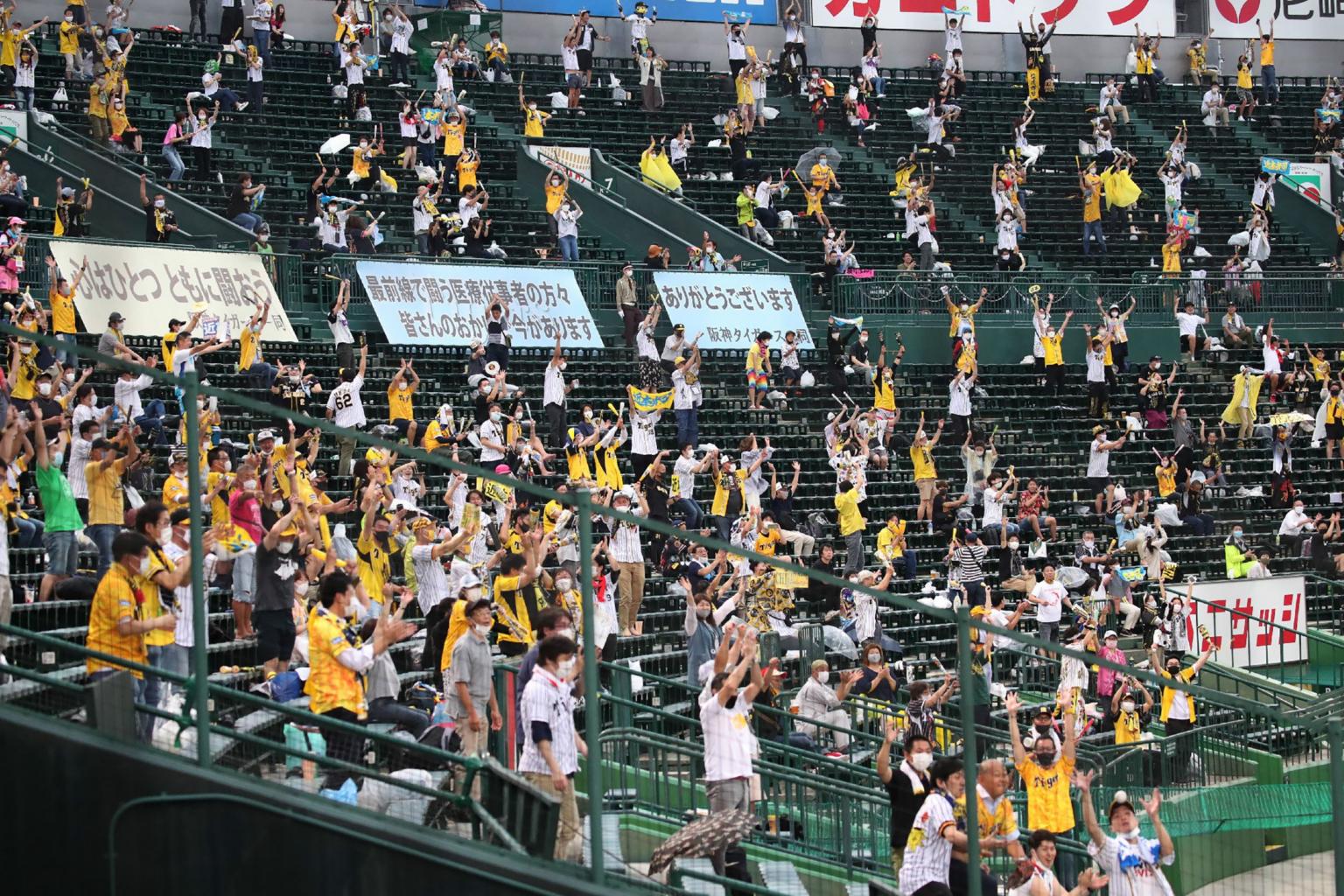Masked fans return to stadium as Tokyo confirms 206 new coronavirus cases
Sign up now: Get insights on Asia's fast-moving developments

Fans cheering as they watch a Japanese professional baseball match in Nishinomiya on July 10, 2020.
PHOTO: AFP
Follow topic:
TOKYO/NAGOYA (REUTERS, BLOOMBERG) - Tokyo officials confirmed 206 new coronavirus infections on Saturday (July 11), public broadcaster NHK reported, as Japan's capital struggles with a resurgence in cases after the government lifted a state of emergency.
The total marks the third straight day of more than 200 cases and follows a record high of 243 new cases reported on Friday.
Coronavirus cases have surged particularly in Tokyo's Kabukicho red-light district.
Despite the recent flare-up in Tokyo, Japan proceeded to restart large-scale sporting events with spectators on Friday, making it among the first countries to do so in the pandemic era.
From Friday, events with as many as 5,000 people are allowed. That evening, five baseballs games went ahead in five different cities across the country, taking in spectators for the first time this season.
In the Nagoya Dome, infielder Dayan Viciedo walked to the plate and slugged a "sayonara" home run after a relatively tight 10 innings of play, leading the Chunichi Dragons to a dramatic 3-2 win over the Hiroshima Carp.
The home crowd of 4,958 erupted, jumping up and down, clapping and yelling - precisely the full-throated show of enthusiasm that Japan's baseball league officials had spent months devising ways to prevent.
By the end of the night, it was clear that the balancing act of minimising infection risks while maximising excitement was near impossible.
"I don't know if I can really relieve my stress today because I'm not allowed to release my voice," said Dragons fan Kimie Kouketsu, as she entered the stadium.
"But who knows, I might sneak in a quick yell," she said with a laugh.
Opening the gates to fans - albeit only 5,000, or about one-tenth of Nagoya Dome's total capacity - came at a particularly tense time in Japan, which is facing a resurgence of coronavirus cases around Tokyo.
But the country in general has had far fewer cases than other major countries, with just around 21,000 versus more than 3.1 million in the US, according to data compiled by Johns Hopkins University.
How Japan and some of its Asian neighbours are managing to keep infections low without resorting to the heaviest restrictions could provide a template for other places trying to reopen.
Mr Scott Boras, a sports agent who represents more than 170 professional baseball players, cited Japan, Korea and Taiwan as models for Major League Baseball, which has so far struggled to start its 2020 season.
Its first game, without fans, is currently scheduled for July 23, nearly four months behind schedule.
"It's very helpful to see baseball being operated safely in other environments," Mr Boras said in an interview.
Major League Baseball teams are particularly paying close attention to procedures Japan and Korea are putting into place for the return of spectators.
Ticket sales account for the bulk of revenues for the teams, which are racking up big losses on player salaries.
Japan's baseball season kicked off on June 19 after a three-month delay, initially without any fans watching.
Baseball in Taiwan, which has reported 451 Covid-19 cases, has included fans since May and recently stopped requiring people to wear masks.
Like Japan, South Korea didn't impose lockdowns and has been able to control flare-ups with widespread testing and contact tracing.
Once the world's second-worst outbreak, South Korea now has one of the lowest rates of infection and fatality.
Still, the government is taking a more cautious approach to opening up its economy than Japan and has delayed giving baseball the go-ahead to open the gates to fans.
NO YELLING, PLEASE
In Japan, fans attending Friday's games were met with a slew of new rules that proved hard to adhere to: no loud yelling, no high-fives, no towel twirling and no shouting through hands cupped like a "megaphone."
Beyond the risk of gathering thousands of people together in crowds, research shows that yelling and singing are particularly dangerous because of the tiny respiratory particles emitted.
It's why choirs and karaoke bars have been tied to outbreaks.
"Hello everyone!" the announcer said over the stadium loudspeakers before play began in the Nagoya Dome.
Fans responded mostly with silence, following the rule against loud talking.
"Thank you for saying hello back to me from inside your hearts," the announcer replied.
League officials encouraged fans to use electronic whistles and devices to play pre-recorded cheers, instead.
Masks were mandatory and entry into the stadium was barred for anyone showing cold symptoms or whose temperature was above 37.5 deg C.
Seating was socially-distanced, with alternating empty rows and spaces left between groups.
Some spectators laid towels on vacant chairs to make it feel less empty. Others did their best to restrain themselves from chasing foul balls, although a few fans made half-hearted tries, despite instructions not to.
BEER FLOWING
At some points during the early innings, it was quiet enough to hear the whirring of the stadium's air-conditioners.
Some people took to whispering to avoid being overhead in a stadium that might normally hold 50,000.
But as the game wore on and the beer kept flowing, the crowd got rowdier.
Some fans began calling players' names and, as the atmosphere built, big plays started to elicit cheers. Stadium attendants didn't intervene.
For the players, having fans in the stands provided a welcome boost after more than a dozen games played in empty stadiums.
Three of Friday's games were won on runs scored in the final inning, a sign of how fans can sometimes sway outcomes.
"The fans cheering gave me power," Viciedo, one of four non-Japanese players on the Dragons, told the crowd after scoring his walk-off home-run.
"Thank you for your terrific rooting. It is because you came here today that I was able to play well."

